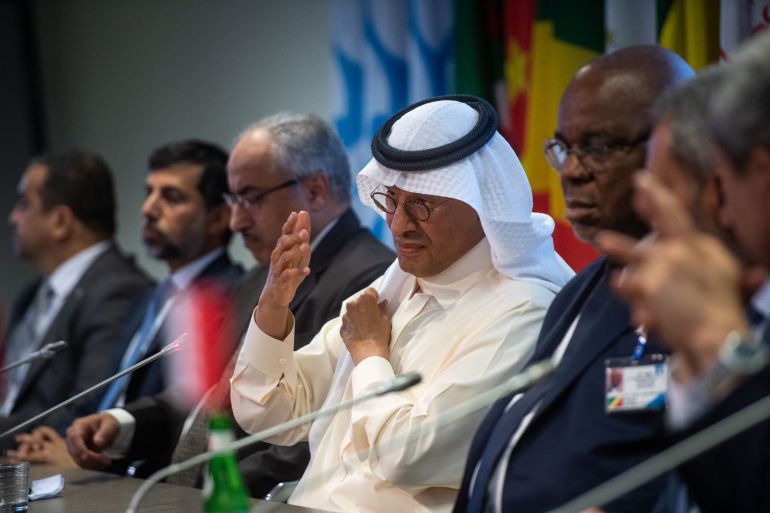Is OPEC ‘aligning with Russia’ after production cuts?
The United States has accused OPEC oil-producing nations of siding with Russia after a decision to cut oil output.

A decision by the OPEC+ alliance of oil-exporting countries to sharply cut production and boost crude prices has dealt a blow to consuming nations, prompting accusations that Gulf producers are siding with Russia at the expense of the United States and its Western allies.
The 13-nation OPEC group, plus 10 allies led by Moscow, agreed at a meeting in Vienna to slash output by two million barrels per day (bpd) starting in November, the group announced in a statement on Wednesday.
Keep reading
list of 3 itemsShould Europe shelter Russians fleeing mobilisation?
OPEC+ cuts oil production by 2m barrels a day despite US pressure
The Biden administration, which for months has engaged in diplomatic efforts to dissuade its Middle Eastern allies from cutting oil production, reacted frustrated at the prospect of pump prices increasing further before a key midterm election.
White House press secretary Karine Jean-Pierre told reporters on Wednesday that the OPEC+ decision was “short-sighted” as the global economy was still languishing from “the continued negative impact of [Russian President Vladimir] Putin’s invasion of Ukraine”.
“It’s clear that OPEC+ is aligning with Russia with today’s announcement,” Jean-Pierre concluded.
But OPEC has denied that accusation. The group’s secretary-general, Haitham al-Ghais, on Friday said, “This was not a decision from one country against another.”
“I want to be clear in saying this, and it’s not a decision from two or three countries against a group of other countries,” al-Ghais told Al Arabiya TV.
Saudi Arabia, one of the main players in OPEC, also said the move was necessary to respond to rising interest rates in the West and a weaker global economy.
“Show me where is the act of belligerence,” energy minister Prince Abdulaziz bin Salman said, adding that markets required “guidance without which investment would not happen”.
A gamble on high prices
Kuwait’s acting oil minister, Mohammed al-Fares, said on Wednesday that while the alliance understood consumers’ concerns over soaring prices, their main concern was “maintaining balance between supply and demand”.
Carole Nakhle, head of the consultancy firm Crystol Energy, dismissed the explanation. “The market always balances itself, that’s the basics of the interaction between demand and supply,” Nakhle told Al Jazeera.
“The difference is that if you leave it to the market, it might give you a price that is much lower than what OPEC wants to see.”
Analysts viewed the move as raising the risk of a global economic downturn, as well as the geopolitical temperature, in a bid to see prices hold around current levels.
“OPEC+ probably feels it has some time on its side to see if the world economy can avoid a recession and whether it can hold crude prices on what the group would view as the correct side of $90 a barrel,” energy analyst Clyde Russell wrote in a column for Reuters.
While a cut to production quotas of two million bpd does not translate into a decrease of the same amount in the global supply, the research company Rystad Energy still placed the likely actual drop at around 1.2 million bpd.
“We believe that the price impact of the announced measures will be significant,” Vice President Jorge Leon told Al Jazeera via email.
Forecasts had predicted that oil prices would fall by the end of the year, but after the OPEC+ decision, the price of Brent oil could now reach more than $100 per barrel in December, up from an earlier call of $89 per barrel.
A political shift towards the Kremlin?
Washington has been angered that Saudi Arabia would support a step that, while to its short-term economic benefit, is at odds with Riyadh’s long-term security interests and weakens Biden’s outlook in advance of the November elections.
Additionally, Russia stands to benefit from high oil prices, which have so far allowed the Kremlin to withstand the shock of Western sanctions.
The OPEC+ decision came a day after EU ambassadors agreed to impose a new round of economic measures in an attempt to weaken Russia’s war effort in Ukraine, including a price cap on Russian oil sales and a ban on most crude oil imports to be rolled out in the next months.
While a direct correlation between the two events can only be inferred, “there must be some politics [in the OPEC+ decision],” Ben McWilliams, energy consultant at the Brussels-based Bruegel think-tank, told Al Jazeera.
From the economic perspective, the argument brought forward by oil-producing countries that a global recession was driving prices down, appears to contradict current crude prices being above $85 per barrel – a healthy rate that in normal times would not have called for intervention.
“It looks clear that there is some kind of alignment with Russia,” McWilliams said.
But not everyone agreed.
Dina Esfandiary, senior adviser at International Crisis Group for Middle East-North Africa, played down the desire of Gulf states – who in March voted for a UN General Assembly resolution condemning Moscow’s invasion of Ukraine and have since largely sought to maintain a low profile – to align with Russia.
“It’s unfair to say that they’re siding with Russia – they’re siding with themselves,” Esfandiary said.
Nonetheless, the move could well be “a snub” to the Biden administration, whose unsuccessful diplomatic effort to halt the oil production cut is a signal of its weaning influence over Gulf allies.
The months-long pressure campaign culminated in Biden’s fist bump to Saudi Arabia’s Crown Prince Mohammed bin Salman in July, a sign of the administration’s intention to move on from its stated goal of holding the Saudi leader accountable for the killing of journalist Jamal Khashoggi.
“Ultimately, I think we’re just in this new era where the Gulf Arabs are deciding for themselves,” the ICG analyst said. “While the US is an important security guarantor, they are no longer listening to everything the US asks them to do.”